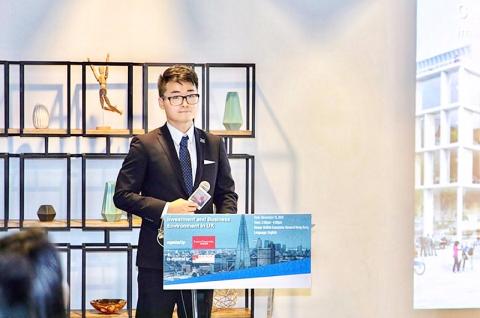Simon Cheng (鄭文傑), a Hong Konger who was detained by China in August while employed by the British consulate in Hong Kong, on Saturday said that he had been followed by an “unknown person” while visiting Taiwan.
Cheng, who was in Taiwan from Aug. 30 to Nov. 29, on Saturday told the Liberty Times (the Taipei Times’ sister newspaper) that someone had begun following him after he told foreign media in Taipei about how he was tortured during his 15 days in detention in China.
The experience made him worry about his safety, but he remained confident in the Taiwanese government’s abilities, he said.

Screen grab from Simon Cheng’s Facebook account
The Ministry of Foreign Affairs said that the British Office Taipei had warned it that he would be interviewed in the city.
While at Eslite Bookstore in Taipei’s Xinyi District (信義) Cheng noticed he was being followed by a middle-aged man who he had seen a few hours earlier at the nearby Xiangti Avenue Plaza, he said, adding that the man had changed his clothing.
While in the bookstore, the man — whose identity and intentions he was unsure of — was watching him while pretending to read, Cheng said.
He said that after being notified about the issue, the government arranged for bodyguards to stay with him.
Police said initial investigations found that the man was not Taiwanese and did not appear to be associated with any local pro-China group.
In interviews with the BBC and the Washington Post published on Nov. 20, Cheng said that he had been tortured by Chinese police to extort a confession.
“They wanted to know what role the UK had in the Hong Kong protests — they asked what support, money and equipment we were giving to the protesters,” he told the BBC.
Chinese police told him during his interrogation that many Hong Kong protesters who had been arrested were sent to China where they were being detained, Cheng told the Liberty Times.
British Secretary of State for Foreign and Commonwealth Affairs Dominic Raab had summoned Chinese Ambassador to Britain Liu Xiaoming (劉曉明) over Cheng’s arrest and torture.
Liu has said the Hong Kong protests have “nothing to do with democracy,” and that Beijing never asked Hong Kong to change its laws.
Cheng said that the British government has canceled his contract out of concerns for his safety, as the job requires frequent travel to China.
There was also concern that his enthusiasm for discussing the Hong Kong’s government’s policies and the territory’s ongoing democracy movement were in conflict with the principle of neutrality that public officials normally adhere to, he said.
The UK government gave him a two-year working holiday visa, but he is in talks to secure permanent residence or citizenship, Cheng said, adding that he is also looking for a job with the UK parliament or a think tank.
He also plans to visit the US and countries in Europe to secure support in the defense of Hong Kong’s freedom and Taiwan’s democracy, he said.
Cheng said he feels safer in the UK than he did in Taiwan, but that he also loves Taiwan because he graduated from National Taiwan University, which changed the course of his life.
He plans to visit Taiwan often, he added.

An essay competition jointly organized by a local writing society and a publisher affiliated with the Chinese Communist Party (CCP) might have contravened the Act Governing Relations Between the People of the Taiwan Area and the Mainland Area (臺灣地區與大陸地區人民關係條例), the Mainland Affairs Council (MAC) said on Thursday. “In this case, the partner organization is clearly an agency under the CCP’s Fujian Provincial Committee,” MAC Deputy Minister and spokesperson Liang Wen-chieh (梁文傑) said at a news briefing in Taipei. “It also involves bringing Taiwanese students to China with all-expenses-paid arrangements to attend award ceremonies and camps,” Liang said. Those two “characteristics” are typically sufficient

A magnitude 5.9 earthquake that struck about 33km off the coast of Hualien City was the "main shock" in a series of quakes in the area, with aftershocks expected over the next three days, the Central Weather Administration (CWA) said yesterday. Prior to the magnitude 5.9 quake shaking most of Taiwan at 6:53pm yesterday, six other earthquakes stronger than a magnitude of 4, starting with a magnitude 5.5 quake at 6:09pm, occurred in the area. CWA Seismological Center Director Wu Chien-fu (吳健富) confirmed that the quakes were all part of the same series and that the magnitude 5.5 temblor was

The brilliant blue waters, thick foliage and bucolic atmosphere on this seemingly idyllic archipelago deep in the Pacific Ocean belie the key role it now plays in a titanic geopolitical struggle. Palau is again on the front line as China, and the US and its allies prepare their forces in an intensifying contest for control over the Asia-Pacific region. The democratic nation of just 17,000 people hosts US-controlled airstrips and soon-to-be-completed radar installations that the US military describes as “critical” to monitoring vast swathes of water and airspace. It is also a key piece of the second island chain, a string of

The Central Weather Administration has issued a heat alert for southeastern Taiwan, warning of temperatures as high as 36°C today, while alerting some coastal areas of strong winds later in the day. Kaohsiung’s Neimen District (內門) and Pingtung County’s Neipu Township (內埔) are under an orange heat alert, which warns of temperatures as high as 36°C for three consecutive days, the CWA said, citing southwest winds. The heat would also extend to Tainan’s Nansi (楠西) and Yujing (玉井) districts, as well as Pingtung’s Gaoshu (高樹), Yanpu (鹽埔) and Majia (瑪家) townships, it said, forecasting highs of up to 36°C in those areas